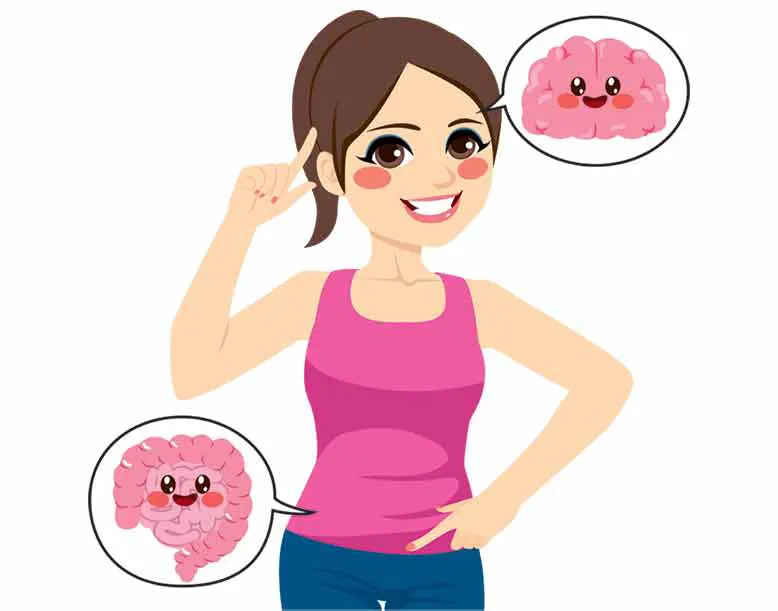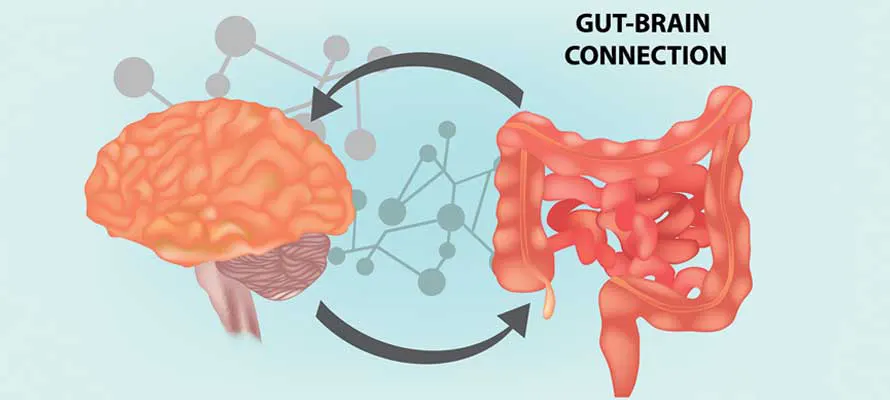Picture yourself in front of hundreds of people, getting ready to present a speech or a seminar.
How do you feel?
Are you starting to feel butterflies in your stomach?
This butterfly feeling is not just “in your head” but is actually a reaction that is communicated from to your brain.
About The Gut-Brain Axis
The bi-directional connection between your gut (or enteric nervous system) and the and brain (central nervous system) is known as the gut-brain axis[1]
Recent studies of the gut-brain connection have revealed a complex communication system that not only ensures the proper maintenance of adequate gastrointestinal health and digestion but is likely to have multiple effects on mood, anxiety, memory, and motivation.[2]
This article will dig deep into this connection and explain how important it is to consider your nutrition and gut health when it comes to improving your mood, memory, and stress.
The Nervous System
Central Nervous System vs. Peripheral Nervous System
The Nervous system is a fascinating and very complex system in your body. The nervous system is made up of the central nervous system and the peripheral nervous system.
The “Second Brain” or “The Brain in the Gut”
One of the main divisions of the involuntary portion of the peripheral nervous system is the enteric nervous system (ENS). The ENS is a system of neurons embedded in the wall of the digestive tract.[4]
It allows the gastrointestinal tract to properly digest, absorb, and secrete the food we eat. The ENS is sometimes considered the “second brain” or “the brain in the gut” because it can actually operate independently of the central nervous system.

The gut-brain axis refers to the physical and chemical connections between your gut and brain. Image via Shutterstock
How is your Gut Affecting your Brain?
Remember those 100 trillion neurons hanging out in your peripheral system?
Many of these neurotransmitters produced have a direct link to stress, anxiety, and depression.
Scientists have found that gut bacteria is the main producer of serotonin, dopamine, and GABA[5].
- Serotonin: Approximately 90% of your serotonin is produced in the gut. Serotonin is a neurotransmitter that is the major contributor to feelings of well-being and happiness. Imbalance in serotonin can lead to sadness and depression[5].
- Dopamine: Certain species of bacteria can produce dopamine. Dopamine is a neurotransmitter that plays a role in how we feel pleasure, memory, and motivation. Low dopamine levels can lead to depression, lack of motivation, and even dementia[5].
- GABA: GABA (Gamma-Aminobutyric Acid) can be produced from bacteria. It is a neurotransmitter that blocks impulses between neurons in the brain. Low levels of GABA have been linked to anxiety and mood disorders.[6]
What Foods Can Help with the Gut-Brain Axis?
- Yogurt – Yogurt is made by fermenting milk with bacterial cultures such as Lactobacillus bulgaricus and Streptococcus thermophilus. These strains of bacteria have been found to help produce gamma-amino butyrate (GABA) and serotonin[7].
- Kefir – Kefir is a fermented yogurt drink made from fermenting milk and kefir grains. Kefir is full of probiotics as kefir grains contain up to 61 strains of bacteria and yeast. Studies have shown that drinking kefir for four weeks can show improvements in emotion[8].
- Kombucha – Kombucha is a fermented tea drink made from tea, sugar, and bacteria. When fermented, Kombucha produces lactic acid bacteria which is linked to increased probiotic function.
- Sourdough – Sourdough bread is baked differently from other wheat bread. It is made by the fermentation of dough by using the bacteria lactobacillus and yeast. Lactobacillus is the strain of bacteria that produces gamma-amino butyrate (GABA).
- Olive Oil – Olive oil is high in both fatty acids and polyphenols. Fatty acids act as an anti-inflammatory in the gut. Polyphenols are chemicals that are naturally found in plants and aid in the digestion on probiotics and gut bacteria.
- Whole grains, Fruits, and Vegetables – Whole grains, fruits, and vegetables are all high sources of fiber. These high fiber foods contain prebiotics and are essentially a probiotic’s main food source. Our guts rely on our diets to provide the prebiotics to produce a healthy gut. Prebiotics has also been linked to reduced stress hormones in the body[10].
- Fatty fish – Fatty fish such as salmon, sardines, and anchovies have high amounts of omega-3 fatty acids. Omega-3 fatty acids have been shown to increase the good bacteria in the gut. Omega 3 fatty acids are also found in high quantities in the brain.
- Coffee & Green tea – Coffee and tea contain large amounts of polyphenols. Polyphenols are chemicals that are naturally found in plants. These chemicals are digested by your gut bacteria. Polyphenols have been linked to improvements in digestion and cognition[11].
- Turkey – Turkey, as many of us know, contains tryptophan. Tryptophan is an essential amino acid, found in dietary proteins, including meats, eggs, dairy, and fruits that converts into the neurotransmitter serotonin[6].
Conclusion
The gut-brain axis is our body’s link from the gut to the brain.
To help the brain function properly, it is important to eat a diet rich in polyphenols, fatty acids, prebiotics and probiotics.
A healthy gut produces more of the neurotransmitters responsible for improved mood, memory, and stress.
SOURCES
Health Insiders relies on peer-reviewed studies, academic research institutions, and medical associations. We avoid using tertiary references. You can learn more about how we ensure our content is accurate and current by reading our editorial policy.
[1] Carabotti M, Scirocco A, Maselli MA, Severi C. The gut-brain axis: interactions between enteric microbiota, central and enteric nervous systems. Ann Gastroenterol. 2015 Apr-Jun;28(2):203-209. PMID: 25830558; PMCID: PMC4367209
[2] Mayer EA, Tillisch K, Gupta A. Gut/brain axis and the microbiota. J Clin Invest. 2015;125(3):926-938. doi:10.1172/JCI76304
[3] Cryan JF, Dinan TG. Mind-altering microorganisms: the impact of the gut microbiota on brain and behaviour. Nat Rev Neurosci. 2012 Oct;13(10):701-12. doi: 10.1038/nrn3346. Epub 2012 Sep 12. PMID: 22968153
[4] Costa M, Brookes SJ, Hennig GW. Anatomy and physiology of the enteric nervous system. Gut. 2000 Dec;47 Suppl 4(Suppl 4):iv15-9; discussion iv26. doi: 10.1136/gut.47.suppl_4.iv15. PMID: 11076898; PMCID: PMC1766806
[5] Galland L. The gut microbiome and the brain. J Med Food. 2014;17(12):1261-1272. doi:10.1089/jmf.2014.7000
[6] Mittal R, Debs LH, Patel AP, Nguyen D, Patel K, O'Connor G, Grati M, Mittal J, Yan D, Eshraghi AA, Deo SK, Daunert S, Liu XZ. Neurotransmitters: The Critical Modulators Regulating Gut-Brain Axis. J Cell Physiol. 2017 Sep;232(9):2359-2372. doi: 10.1002/jcp.25518. Epub 2017 Apr 10. PMID: 27512962; PMCID: PMC5772764
[7] Tillisch K et al. Consumption of Fermented Milk Product With Probiotic Modulates Brain Activity. Gastroenterology. 2013 Jun; 144(7): 10.1053/j.gastro.2013.02.043.
[8] Bourrie BC, Willing BP, Cotter PD. The Microbiota and Health Promoting Characteristics of the Fermented Beverage Kefir. Front Microbiol. 2016 May 4;7:647. doi: 10.3389/fmicb.2016.00647. PMID: 27199969; PMCID: PMC4854945
[9] Crumeyrolle-Arias M, Jaglin M, Bruneau A, Vancassel S, Cardona A, Daugé V, Naudon L, Rabot S. Absence of the gut microbiota enhances anxiety-like behavior and neuroendocrine response to acute stress in rats. Psychoneuroendocrinology. 2014 Apr;42:207-17. doi: 10.1016/j.psyneuen.2014.01.014. Epub 2014 Jan 31. PMID: 24636517.
[10] Schmidt K, Cowen PJ, Harmer CJ, Tzortzis G, Errington S, Burnet PW. Prebiotic intake reduces the waking cortisol response and alters emotional bias in healthy volunteers. Psychopharmacology (Berl). 2015;232(10):1793-1801. doi:10.1007/s00213-014-3810-0
[11] Brickman AM, Khan UA, Provenzano FA, et al. Enhancing dentate gyrus function with dietary flavanols improves cognition in older adults. Nat Neurosci. 2014;17(12):1798-1803. doi:10.1038/nn.3850







 This article changed my life!
This article changed my life!
 This article was informative.
This article was informative.
 I have a medical question.
I have a medical question.
 Ask a Question
Ask a Question

 This article contains incorrect information.
This article contains incorrect information.
 This article doesn’t have the information I’m looking for.
This article doesn’t have the information I’m looking for.